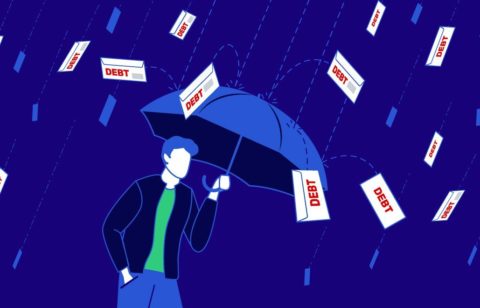Do you know your debt-to-income ratio? If not, you probably should.
Determining it will help you better understand your overall financial health. It enables you to see what lenders and other people who check your credit will learn about you. This is important information since it is used to determine if you are a good candidate for a car, a mortgage, or a job—or if your financial situation makes you a high-risk proposition.
Understanding your debt-to-income ratio can also help you determine where you need to focus to get your financial house in order.
But first, let’s define what a debt-to-income ratio is.
What is a debt-to-income ratio?
The debt-to-income ratio is a tool that measures the amount of debt you hold in relation to your income. The ratio is determined by dividing the total amount of monthly debt payments you make by your gross monthly income.
Your gross monthly income is the amount of money you bring in before accounting for taxes and deductions.
For example, if you have $3,000 in monthly debt payments — including your mortgage, auto loan and credit card obligations — and your monthly income is $6,500, your debt-to-income ratio would be 46%
How to know if you’re in trouble
So, what is a bad debt-to-income ratio? Some lenders say you should keep your debt-to-income ratio at or below 43%. Others recommend keeping it at no more than 35%.
If your ratio is higher, consider it a warning sign that you are in dangerous financial territory. Lenders are going to consider you a risk and they may not be willing to approve a loan or extend credit.
Unfortunately, many young adults find themselves with a higher debt-to-income ratio after college. Most people do not begin their adult lives with significant assets in the bank, and often purchase large items like cars with a minimum down payment. As a result, they are left with a high debt-to-income ratio.
This situation can be fixed over time. For example, after a few years of paying down a car or mortgage while carefully avoiding additional debt, you can bring a high personal debt-to-income ratio into acceptable territory. A debt-to-income ratio of around 2 or 2.5 is generally considered good.
Reducing your debt-to-income ratio
If you calculate your debt-to-income ratio and determine it is high, you should consider taking immediate action to lower it. Failing to do so may block you from obtaining credit for important purchases, such as a home or a car.
Don’t fret. There are a few things you can do to improve your ratio if you find yourself in perilous territory.
Track your debts more closely
One of the biggest problems people have in maintaining a low debt-to-income ratio is simply keeping track of all their debts. Gather all your records and write down the balances of all outstanding debt, including a mortgage, other loans, and your credit cards. It is also important to know how much your monthly payments are on all your debts.
Once you have done your homework, obtain a copy of your credit report. It provides a good understanding of what creditors see, and it may help you spot a debt that you forgot about or find mistakes that need to be corrected.
Federal law ensures your right to one free credit report annually from each of the three major credit-reporting agencies – Equifax, Experian and TransUnion. As a bonus, these agencies are offering free weekly reports through the end of 2023. Get your free report at the AnnualCreditReport.com website.
Use the information you gather from your credit reports to stay focused on paying off your debts.
Make a plan
After you have the big picture, determine the best way to start paying down your balances. In some cases, making an effort may be all you need to commit more money each month to cover your debts and improve your debt-to-income ratio.
Create a payoff strategy to help you apply your resources more effectively. Some people prefer to pay off their debts starting from the smallest to the largest. This method helps you lower your number of creditors by eliminating one debt before moving on to the next one. This is known as the “snowball method,” and it works by keeping you motivated as you feel the satisfaction of completely paying off debts, one by one.
Other people prefer to employ the “avalanche method,” in which you tackle your debts by paying off those with the highest interest rates first. This means it can take longer to pay off each debt. However, over the long haul, you are likely to save more money by paying off creditors with the highest interest rate first.
Get help
When you analyze your debt-to-income ratio for the first time, you may realize you are in over your head and don’t have a clear way to pay off your debts. When you reach that point, you may want to seek help.
Some borrowers use a debt consolidation loan, which combines all their outstanding debts into one single low-interest loan. While this will not lower your debt-to-income ratio, it will make it easier to handle your debt payments. Otherwise, you will be juggling multiple payments that are due at varying times of the month.
Other borrowers consider using the services of a debt settlement company, which works with creditors on your behalf to address outstanding debts.
Still others may attempt to work with a credit counselor. They can advise you on your money and debts, help with a budget, and offer money management workshops.
Finally, borrowers who are in particularly dire financial straits with no realistic way of paying off their debts may declare bankruptcy.
Finding a measure of financial health
If you don’t know your debt-to-income, you should take the time to calculate it. After all, you can be certain that your potential creditors will.
Your debt-to-income ratio is a great tool for determining whether you have the right balance of income and debt, or if excessive debts are putting you in a dangerous position.
So, gather all your credit card and loan statements, pull out our handy debt calculator, and calculate your ratio today. Otherwise, what you don’t know can hurt you







